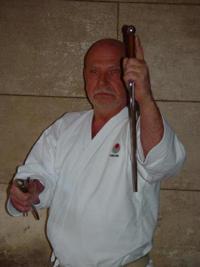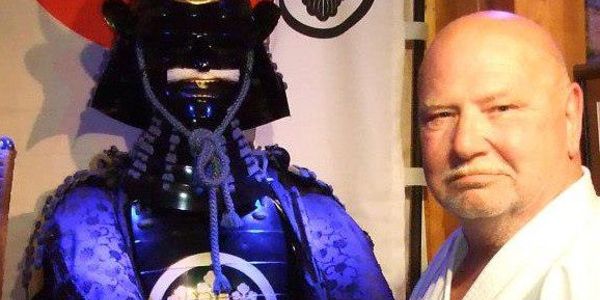Q. Ronnie Colwell, your last public interview was way back in 1984 in Combat Magazine. Why no interviews until now?
RC. For the last 20 years I have been discovering answers to give. After several bitter episodes in 1984 I had more questions of my own than answers. So I have spent the last 20 years seeking and researching the answers myself. To this end I have travelled to many countries, studying, observing, asking questions, taking instruction and creating my own archives.
Q. Did this study involve the UK?
 RC. Absolutely, this took many roads but I believe the most important was on the 28th April 1984. I was teaching a student of mine at his dojo, when at the end of the class he announced that he was retiring from instruction as he was disillusioned with the direction society was moulding karate. We talked at length and both came to the same conclusion that karate was in turmoil and we were both equally disillusioned. As he said at the time “all that I hold precious and have worked hard to discover is now available on video, so what is the point!” So, I challenged him to a true commitment. To unearth, not only new discoveries in training, but also new truths in himself and indeed ourselves. So we formed a pact to find a new way of practice. We devoted three whole days a month to the study of what we would later term the true way. After one month we decided to test our resolve by basing our training in Ennerdale in Cumbria. We then set a time of 20 years to see what we could discover since this was a personal quest not driven by a commercial quick fix. This training became more and more intense as we learnt to remove filters that had been applied to karate to make it a more marketable product. The discoveries we made were amazing.
RC. Absolutely, this took many roads but I believe the most important was on the 28th April 1984. I was teaching a student of mine at his dojo, when at the end of the class he announced that he was retiring from instruction as he was disillusioned with the direction society was moulding karate. We talked at length and both came to the same conclusion that karate was in turmoil and we were both equally disillusioned. As he said at the time “all that I hold precious and have worked hard to discover is now available on video, so what is the point!” So, I challenged him to a true commitment. To unearth, not only new discoveries in training, but also new truths in himself and indeed ourselves. So we formed a pact to find a new way of practice. We devoted three whole days a month to the study of what we would later term the true way. After one month we decided to test our resolve by basing our training in Ennerdale in Cumbria. We then set a time of 20 years to see what we could discover since this was a personal quest not driven by a commercial quick fix. This training became more and more intense as we learnt to remove filters that had been applied to karate to make it a more marketable product. The discoveries we made were amazing.
 Ronnie ColwellQ. What are these discoveries?
Ronnie ColwellQ. What are these discoveries?
RC. Well they will never be on video…..laughter!!
Q. Can you elaborate on the filters you mentioned earlier?
RC. Early on during the popularization of karate, which was and is an ever evolving entity, what I call filters were applied. We filtered out the weapons heritage of poles, sai, nunchaku, tonfa etc. and in the mainstream karate they have almost vanished. Groundwork again has been filtered, and now non-existent in main stream karate. When the standing fighter goes to the floor what happens? Do you think the foundering fathers never thought of this? Karate was designed to be an all embracing fighting system that, taking away the fine words, was used to fight in the street and any situation. With the filters applied that is no longer true and we have the situation were self defence is taught as a separate thing. Many fine words and rhetoric are given about the character building, inner contentment, the re-discovered mutuality, and the sad statements by leading masters that karate is not suitable as a streets fighting form. If that is so what is the point? Should we not be honest and say that we practice an aesthetic callisthenic form and not a realistic fighting system. I find this a great sadness and hope that a few of you will join me in this feeling. My 20 year study as identified over 50 filters that once removed and replaced bring karate back to it’s bright jewel.
Q. Recently, as most seniors in karate, know of your recent illness and your bereavement. You appear fit and well. Is this the case?
RC. Yes, physically very well for my age. However, I’m deeply upset by the EKGB, which didn’t even send a letter of condolence when my wife passed away in December 2002. FEKO and other groups around the world sent their support but not the EKGB. This hurt and made me feel very sad and I will not forget it.
 Q. Was the past all bad?
Q. Was the past all bad?
RC. No, I have many many special memories of events and friendships from my involvement in the martial arts over more than half a century. I could fill this magazine with names of those I admire but want to mention just a few and hope that those I miss will not feel slighted. I start with the late and great Colin Williams and also the late Gary Spiers. Both dear and sadly missed friends. Thankfully still with us are Eddie Daniels, Eddie Cox, Pete McDowell and Kelvin Alleyne. In Scotland, Tommy Morris and Hamish Adams, in Northern Ireland, Oliver Brunton. In England, Ticky Donovan, for his innovation and success. I believe him to be the best team manger in the world. No Japanese has every equalled his record and no one will be prouder than me when Ticky leads our team into the Olympics. Also, the current FEKO Chairman, Brian Philcox. At this point I’d like to make special mention of two fine karateka from the Sei-Bu-Kan Kokusai Kyokai, Bill Evans and Trevor Streets. Both of whom helped me through the worst times of my life.
Q. What are your views on the current state of Karate?
RC. Politically karate is still in turmoil. To my eyes nothing has been resolved in the last thirty years. The vested interest of a small but determined group of business men who are trying to protect their professional interest in karate as a marketable commodity is still rife.
Q. What about the physical standards?
RC. In answering this question I take the physical to be the combination of the mind, body and spirit, as with all budoka, this should be one. I believe there are two separate directions in front of us and it’s now coming to a head to decide whether we are following one of the other. On the one hand is the athlete following sport karate and on the other karateka following traditional karate. The sport karate will enter the Olympics and produce the first super athletes. I, for one, look forward to seeing them. Those who claim to be following the traditional route are in many cases, struggling to re-establish themselves with the past. There is a category of bewildered karateka who because of the swiftness of the progress of sport karate and the loss of the connection with their own traditions feel themselves uncertain and with a lack of direction. In the next two years we will see a polarization of the two paths of sport karate and traditional karate. The sport karate will embrace the Olympic karate and eventually lose the style origins and become homogenised around the WKF rules. In the traditional world we will see a race to re-invent themselves and link themselves with the past. This is not new. Many in the west try to link back to Japan. Many in Japan try to link back to Okinawa. Many in Okinawa try to link back to China. In China they try to link back to India
 Q. You have mentioned “Tokyo Glasses” before can you explain this phrase.
Q. You have mentioned “Tokyo Glasses” before can you explain this phrase.
RC. Those who wear Tokyo glasses view Japan as a romantic land of noble samurai families, not the highly sophisticated industrial world leader. These people want and try to be more Japanese than the Japanese. This is quite comical since they develop mannerisms that the Japanese find laughable. Such people’s minds rest in a Japan that never existed.
Q. I can see you referring to notebooks are these your diaries?
RC. Yes, it has been my habit since a boy to keep a daily diary. As you can see many are just old notebooks etc in which I note down comments made, conversations and my observations. I never realized or could have conceived how these diaries would be of historical interest. They cover my experiences in the karate world, the jyu jutsu world and the kobujutsu world. They do make for interesting reading and at low points I find that a little read can bring laughter to my soul.
Q. Will you ever publish your diaries?
RC. I’m constantly being asked to do so and I’ve always determined to wait until my departure from this life. However, I must confess I do get very tempted when I see over inflated ego’s walking around and I know their true history. I also have photo’s going back to the 50’s as well as all the minutes and notes of every meeting I have attended at English, British, European and World level for all of the organisations I have been involved in.
Q. What of the present?
RC. I am currently very happy because I am immersed in study and am involved with setting up projects that will be very exciting for the future.
This Ronnie Colwell interview appeared in the July 2004 edition of Combat Magazine.


